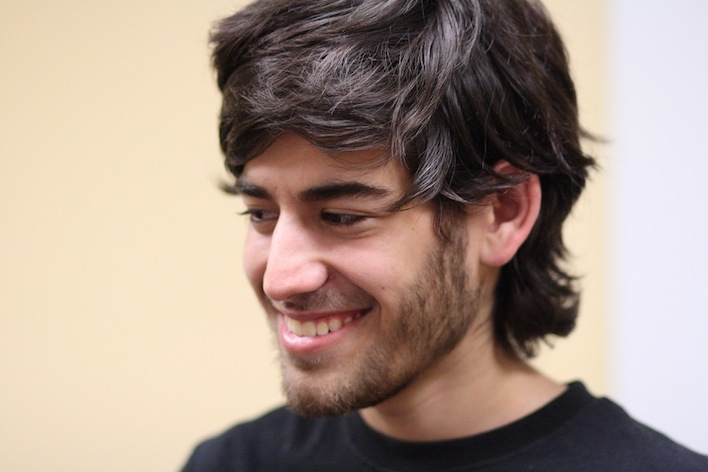MIT released a statement today on the death of Aaron Swartz, a computer programmer and information activist who committed suicide two days ago.
[aditude-amp id="flyingcarpet" targeting='{"env":"staging","page_type":"article","post_id":603812,"post_type":"story","post_chan":"none","tags":null,"ai":false,"category":"none","all_categories":"dev,security,","session":"A"}']MIT president L. Rafael Reif expressed “profound condolences” for the “inexpressible loss” of this talented young developer and activist.
“I want to express very clearly that I and all of us at MIT are extremely saddened by the death of this promising young man who touched the lives of so many,” Reif wrote. “It pains me to think that MIT played any role in a series of events that have ended in tragedy.”
AI Weekly
The must-read newsletter for AI and Big Data industry written by Khari Johnson, Kyle Wiggers, and Seth Colaner.
Included with VentureBeat Insider and VentureBeat VIP memberships.
Swartz’s death came several months before he was due to stand trial on 13 felony counts related to his alleged misuse of MIT’s network to download nearly 5 million academic journal articles from JSTOR, a nonprofit publisher of journals. The charges were not for copyright violation, but for abuse of the MIT network, which the indictment alleges to the Computer Fraud and Abuse Act, an anti-hacking law.
His charges included copyright violations as well as more serious hacking charges. JSTOR declined to press charges, but reports suggest that MIT urged the U.S. Attorney’s office to pursue the case, which it did, aggressively: The charges filed against Swartz may have carried a maximum sentence of 35 years in jail and up to $1 million in fines.
In the wake of his death, many have speculated that Swartz, who suffered from depression, may have been driven to despair by the prospect of prison and by the financial ruin that mounting a legal defense had brought upon him. Some pointed fingers at MIT, and today, MIT responded.
Reif’s letter stops short of an apology, which is probably prudent, given that the circumstances of Swartz’s death are not yet fully known. Reif said that he would appoint MIT professor Hal Abelson to investigate, pursuing “a thorough analysis of MIT’s involvement” in the alleged hacking and the charges.
“I have asked that this analysis describe the options MIT had and the decisions MIT made, in order to understand and to learn from the actions MIT took. I will share the report with the MIT community when I receive it,” Reif wrote.
Security expert Alex Stamos, who would have testified in Swartz’s trial as an expert witness for the defense, argued yesterday that Swartz was not guilty of anything more than “inconsiderate” use of MIT’s network, a use that — ironically — MIT’s and JSTOR’s usage policies actually permitted.
[aditude-amp id="medium1" targeting='{"env":"staging","page_type":"article","post_id":603812,"post_type":"story","post_chan":"none","tags":null,"ai":false,"category":"none","all_categories":"dev,security,","session":"A"}']
The MIT statement is below.
Yesterday we received the shocking and terrible news that on Friday in New York, Aaron Swartz, a gifted young man well known and admired by many in the MIT community, took his own life. With this tragedy, his family and his friends suffered an inexpressible loss, and we offer our most profound condolences. Even for those of us who did not know Aaron, the trail of his brief life shines with his brilliant creativity and idealism.
Although Aaron had no formal affiliation with MIT, I am writing to you now because he was beloved by many members of our community and because MIT played a role in the legal struggles that began for him in 2011.
I want to express very clearly that I and all of us at MIT are extremely saddened by the death of this promising young man who touched the lives of so many. It pains me to think that MIT played any role in a series of events that have ended in tragedy.
I will not attempt to summarize here the complex events of the past two years. Now is a time for everyone involved to reflect on their actions, and that includes all of us at MIT. I have asked Professor Hal Abelson to lead a thorough analysis of MIT’s involvement from the time that we first perceived unusual activity on our network in fall 2010 up to the present. I have asked that this analysis describe the options MIT had and the decisions MIT made, in order to understand and to learn from the actions MIT took. I will share the report with the MIT community when I receive it.
I hope we will all reach out to those members of our community we know who may have been affected by Aaron’s death. As always, MIT Medical is available to provide expert counseling, but there is no substitute for personal understanding and support.
With sorrow and deep sympathy,
L. Rafael Reif
Photo credit: Sage Ross/Flickr
VentureBeat's mission is to be a digital town square for technical decision-makers to gain knowledge about transformative enterprise technology and transact. Learn More

